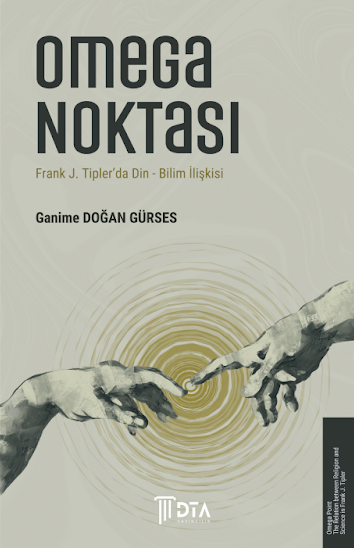
- Anasayfa
- Kategoriler
- Yazarlar
- Hizmetlerimiz
- Akademik Faaliyetler
- Hakkımızda
- İletişim
- Giriş Yap
- Sepet: (0 TL)

| Yazar: | Ganime Doğan Gürses |
| Eser Türü: | Basılı, Dijital |
| Yayıncı: | DTA Yayıncılık |
| Yayın Tarihi: | 12/03/2025 |
| Kategori: | Din Bilimleri |
| Sayfa Sayısı: | 297 |
| Dil: | Türkçe |
| Kapak: | Karton |
| Boyut: | 13.5 x 21 cm |
| ISBN: | 978-625-5959-10-2 |
| E-ISBN: | 978-625-5959-22-5 |
| DOI: |
|
Bu kitap, Amerikalı fizikçi ve kozmolog Frank Jennings Tipler’ın din-bilim-felsefe üçgenindeki kadim spekülasyonları sona erdirebileceğini düşündüğü görüşleri ve bu görüşlerini teorize ettiği Omega Noktası Teorisi üzerinden din-bilim ilişkisine dair bir perspektif sunmayı amaçlamaktadır. Tipler, kavramlarını modern fiziksel kozmoloji, bilgisayar bilimleri ve bilimsel materyalizmden alan bir hipotez olan Omega Noktası Teorisi’nin “hem uzayda hem de uzayın içinde her yerde bulunan, zorunlu olarak var olan, her şeye gücü yeten, her şeyi bilen ve evrimleşen kişisel bir Tanrı” için Yahudi-Hristiyan-İslam geleneğine mutabık, modern teolojik bir model olduğunu iddia etmektedir. İnsanların çok özel bir türden makineler olduğunu, muhtemelen özgür iradeye sahip olduğunu, büyük dünya dinlerinin cennetine oldukça benzeyen bir yerde ölümden sonra bir hayat olduğunu ve bu hayatın önemsiz olmaktan öte evrenin var oluşunun nihai nedeni olarak kabul edilmesine imkân tanıdığını düşünmektedir. Kozmozun nihai geleceğinin ve bu konunun bir yansıması olan eskatolojinin fizikçilerin çalışma sahasında olması gerektiğini savunmaktadır. Teolojik ve metafiziksel terimlerin yalnızca teknik terimlere çevrilerek; teoloji ve felsefenin ise yalnızca bir fizik dalı olarak mevcudiyetini koruyabileceğini iddia etmektedir. Tipler’ın din-bilim ya da teoloji-bilim ilişkisi hususunda modern ve uygulamalı bir izah sunan bu düşünce ve iddialarını anlama, anlamlandırma ve değerlendirilmeye çalışan bu çalışma, genel anlamda insanlığın düşünce tarihinde özel anlamda ise felsefe geleneğinde Tipler’ın düşüncelerinin konumunu irdelemeye çalışmaktadır.
This book aims to present a perspective on the relationship between religion and science through the Omega Point Theory proposed by American physicist and cosmologist Frank Jennings Tipler—an attempt to resolve the long-standing speculations within the religion-science-philosophy triad. Tipler posits that the Omega Point Theory, a hypothesis grounded in modern physical cosmology, computer science, and scientific materialism, constitutes a modern theological model compatible with the Jewish-Christian-Islamic tradition. According to this theory, the universe ultimately evolves into a state characterized by a “personal God who is omnipresent both in and beyond space, necessarily existent, omnipotent, omniscient, and continuously evolving.” Tipler argues that human beings are a very special kind of machine, possibly endowed with free will, and that there is an afterlife resembling the heavens described by the major world religions. He further claims that this afterlife is not merely a consolation but rather the very purpose behind the existence of the universe. He maintains that the ultimate destiny of the cosmos—and the corresponding field of eschatology—ought to fall within the domain of physics. Tipler asserts that theological and metaphysical terms should be translated into technical vocabulary and that theology and philosophy can only remain relevant if considered as subfields of physics. This study seeks to understand, interpret, and critically assess Tipler’s ideas, which offer a modern and applied account of the religion-science or theology-science relationship. It further aims to examine the position of Tipler’s thought both within the broader history of human intellectual tradition and, more specifically, within the philosophical canon.
Felsefe, Din, Bilim, Fizik, Kozmoloji, Teoloji, Metafizik, Tanrı, Frank Tipler
Philosophy, Religion, Science, Physics, Cosmology, Theology, Metaphysics, God, Frank Tipler